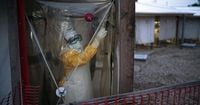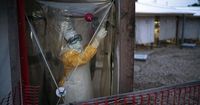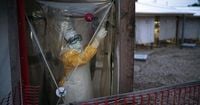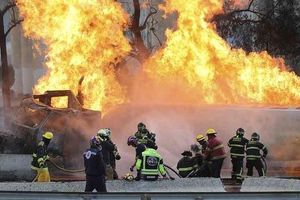Southern Congo is once again in the international spotlight as it contends with its first Ebola outbreak in nearly two decades, a crisis that has rapidly escalated and now tests the resilience and readiness of local and global health systems. The outbreak, confirmed on September 4, 2025, in the remote Kasai province, marks the first time Ebola has struck this region in 18 years, and only the 16th such outbreak for the Democratic Republic of Congo overall, according to the country’s health ministry.
Kasai province, situated more than 1,000 kilometers from the bustling capital of Kinshasa, is now the epicenter of mounting concern. The area’s isolation, coupled with limited infrastructure, has complicated the delivery of urgent medical supplies and personnel. In a recent Geneva briefing, Patrick Otim of the World Health Organization (WHO) described the situation on the ground, noting that a United Nations peacekeeping helicopter had managed to deliver 400 doses of the Ervebo Ebola vaccine to Bulape, the heart of the outbreak. More vaccine doses are reportedly en route from Kinshasa, as authorities scramble to contain the virus.
“We have the expertise, DRC has the expertise, but we need to be able to get the people and supplies into place and we need to be able to pay for the operations,” Otim emphasized, as quoted by Reuters. His remarks underscore the dual challenge facing Congo: while medical know-how exists, the logistical and financial barriers are steep, especially in such a remote setting.
Since the outbreak was first confirmed, the number of suspected and confirmed cases has climbed steadily. As of September 12, 2025, the Congolese health ministry reported 32 suspected cases, 20 confirmed infections, and 16 deaths—a grim reminder of how quickly Ebola can take hold if left unchecked. Otim warned that containing the outbreak is “possible, but it will be challenging if we miss the window of opportunity.” He stressed that the next two weeks are critical for mounting an effective response.
The vaccination campaign is set to begin imminently, with health workers and people who have come into contact with patients prioritized for inoculation. The WHO has also announced plans to request an additional 40,000 to 50,000 vaccine doses for Congo, anticipating the need to expand immunization efforts should the outbreak spread further.
Yet, the battle against Ebola in Kasai is not just a medical one—it is a race against time, resources, and geography. The remote nature of the province means that setting up new treatment facilities is urgent, especially as the outbreak may expand. In fact, one new case has already been confirmed 70 kilometers from Bulape, raising fears that the virus could gain a foothold in other communities.
There are also broader regional concerns. The WHO has assessed a moderate risk of the outbreak spilling across borders, with Angola identified as the most prioritized neighboring country for heightened monitoring and preparedness. Given the interconnectedness of communities and the porous nature of many African borders, vigilance is paramount.
Complicating the response are recent cuts to foreign assistance, particularly from the United States. Several aid workers told Reuters that Congo could struggle to mount an effective response due to the dismantling of the U.S. Agency for International Development (USAID) under President Donald Trump and subsequent funding reductions. These changes have left gaps in support just as the need for international solidarity has grown ever more urgent.
The financial picture is daunting. The WHO has projected that combating the outbreak over the next three months will require around $20 million, while Congo’s own national response plan is estimated at a staggering $78 million. The gap between resources required and those currently available is significant, and the clock is ticking.
Despite these challenges, there are glimmers of hope. The DRC has accumulated considerable experience in tackling Ebola, having weathered 15 previous outbreaks. The rapid deployment of vaccines and treatments, the coordination between the WHO, United Nations, and Congolese authorities, and the mobilization of local health workers all point to a more robust response mechanism than in years past.
Still, the situation remains precarious. Otim’s candid assessment—“We need to be able to get the people and supplies into place and we need to be able to pay for the operations”—rings true for many on the ground. The logistical hurdles are immense: rough roads, limited air access, and the need for cold-chain storage for vaccines all complicate the task at hand. Moreover, the specter of further funding cuts looms large, threatening to undermine hard-won progress.
For the people of Kasai, the outbreak has brought fear and uncertainty. Many remember the devastating toll of previous Ebola crises, both in the DRC and in neighboring countries. The virus, notorious for its high fatality rate and the speed with which it can overwhelm communities, demands a swift and coordinated response. Health workers, often hailed as heroes, now face the dual challenge of treating patients while protecting themselves from infection—a task made all the more difficult by resource constraints.
International observers are watching closely. The risk of the outbreak crossing into Angola or other neighboring states has prompted calls for greater regional cooperation and preparedness. The WHO has urged countries in the region to review their emergency plans, bolster surveillance at border crossings, and ensure that health facilities are equipped to handle potential cases.
As the world grapples with multiple health crises, from COVID-19 to resurgent polio in some areas, the Ebola outbreak in southern Congo serves as a stark reminder of the persistent threat posed by infectious diseases. It also highlights the importance of sustained investment in global health security, robust public health infrastructure, and international cooperation.
With the next two weeks deemed critical, all eyes are on Kasai province. The coming days will reveal whether the combined efforts of local authorities, international agencies, and health workers can halt the spread of Ebola before it spirals out of control. For now, the people of southern Congo—and indeed the world—wait, hope, and prepare.






